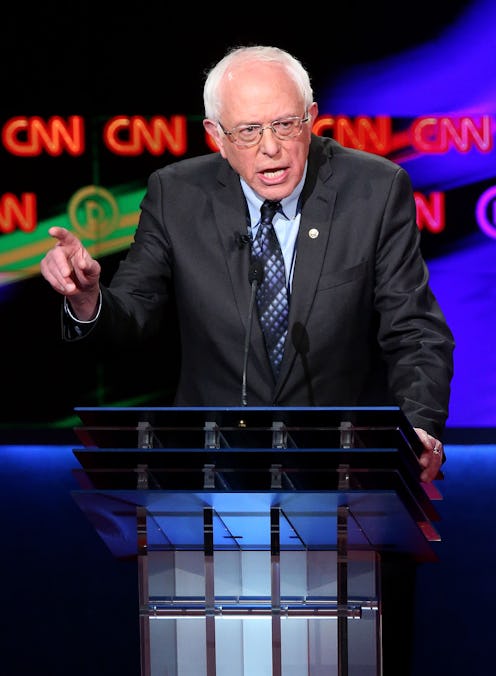News
Bernie Sanders Made An Ableist Joke At The Debate
Well, there's only one of them left now! The seventh Democratic presidential debate is in the books, and we're almost at the finish line for these things. And while Sunday night's debate wasn't quite as offensive, inflammatory, or juvenile as the last one on the Republican side, there was at least one moment you could consider shortsighted and exclusionary. In short, Bernie Sanders' mental health joke was no laughing matter — in fact, it was plainly ableist, and is precisely the sort of thing that should give conscientious progressives pause.
Here's what happened: towards the end of the debate, as a joking aside about how he wants to increase funding and access to mental health services, Sanders cracked a joke that probably sounded innocent to a lot of people, a pointed barb directed at some of the more bizarre moments of last week's Republican debate: "You know, we are, if elected president, going to invest a lot of money into mental health. And when you watch these Republican debates, you know why we need to invest in that." Here's how it looked and sounded — as you can see, it drew an uproarious response, and brought out some laughter from Hillary Clinton, as well.
Look, it's not as though it's some kind of unforgivable, eternal sin if it gave you a chuckle. A lot of jokes can seem harmless and inoffensive enough if you're not attuned to the issues behind them, or how it might sound to someone in a different position. And even offensive jokes can be funny sometimes! But it's important sometimes to take a harder look at things, and here's the flat truth: Sanders' joke reinforces some very old, very tired stereotypes and stigmas about mental health, and furthermore, it tosses people with mental health concerns in with the Republican candidates as the target of the joke.
Sure, it might not immediately seem like a problem, but that's because ableist terms and cracks like these are so routine, and largely unreflected upon in our society. "Lame," "dumb," "crazy," "insane," all of these are words that so often get casually thrown around, with little to no thought about their impact. It can be especially tough to raise awareness about this kind of thing, too, because mental health remain a highly stigmatized subject.
Basically, if you've experienced any mental health issues before, as tens of millions of Americans do, and a joke like that hurts your feelings, you might not feel comfortable speaking up. It's even more touchy considering the recent backlash against being bothered by jokes at all, the so-called anti-PC movement. It's a logic that implicitly lauds the power and impact of jokes to be funny, either despite, because of, or in concert with their offensiveness, but then tells people to shut up if the impact is something else: hurtful.
Not everybody feels this way, thankfully, but it's a distressing attitude all the same. And in a Democratic debate — ostensibly the party of progressive and liberal values — it'd be nice to see this at the very least considered, whether or not it hits home.
Because even though not everyone might be ready to take ableist jokes seriously the way they would, say, if Sanders had made an overtly sexist or racist joke — again, societal norms matter in all this, and the norms relating to ableism are dismal at best — nobody should run away from paying the criticisms some serious mind. And maybe, just maybe, the next time you hear somebody describe dismiss bigotry or virulence as "craziness," or "insanity," you'll hear it with fresh ears, and realize it's actually not so cool.
